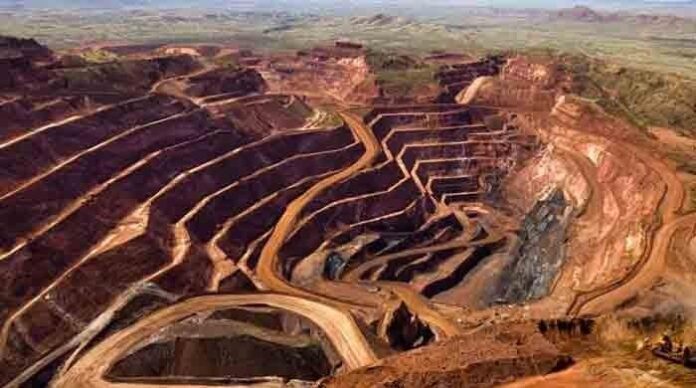ISLAMABAD: Pakistan is seeking the reversal of a $5.8 billion penalty imposed by an international tribunal for denying a mining lease to an Australian company, saying that paying the fine would hinder its handling of the coronavirus pandemic.
Reko Diq town in Balochistan’s Chagai district is famed for its mineral wealth, including gold and copper.
Prime Minister Imran Khan’s government considers it a strategic national asset, though instead of yielding a bonanza the Reko Diq mining project may cost the country dearly.
The World Bank’s International Centre for Settlement of Investment Disputes is considering Pakistan’s appeal against enforcing the penalty over its cancellation of the Reko Diq mining lease for Tethyan Copper Corp, a 50-50 joint venture of Barrick Gold Corp of Australia and Antofagasto PLC of Chile.
In the meantime, the Balochistan government has set up its own company to develop the mine: as prices for commodities surge, with gold recently at more than $2,000 an ounce, turning fiasco to fortune is all the more appealing.
Pakistan and Tethyan both have signalled a willingness to discuss alternative solutions, such as a settlement, but the status of any talks on a deal is unclear. Officials on the Pakistan side said they have not been in direct contact and no specific settlement has been proposed.
Despite the initiation of arbitral proceedings in order to protect its rights, TCC remains hopeful of an opportunity to reach a negotiated resolution to the case, says a statement on the company’s website issued after the 2019 arbitration ruling.
Asked recently, Tethyan officials said there were no updates.
An official in Pakistan’s attorney general’s office said an out-of-court settlement with Tethyan Copper Corp, or TCC, was possible pending a final decision on the award, which might not come until next year.
The Reko Diq case is testing Mr Khan’s ability to use back channel diplomacy to settle disputes and keep alive efforts to lure more foreign investors.
According to details available on Tethyan’s website, the Reko Diq Mining Project was to build and operate a world class copper-gold open-pit mine at a cost of about $3.3 billion. Tethyan says its 1998 agreement with the local Balochistan government entitled it to the mining lease, subject only to routine government requirements.
The project stalled in November 2011 when the Balochistan provincial government rejected the application.
Pakistani officials say the mining lease was terminated by the Balochistan government because it was secured in a non-transparent manner.
By then, Tethyan had invested $220 million in Reko Diq. The Australian mining company sought help from the World Bank arbitration tribunal in 2012, and it ruled against Pakistan in 2017, rejecting an earlier decision against Tethyan by Pakistan’s Supreme Court.
The miner originally sought $8.5 billion. The tribunal opted to use a formula for calculating damages for the cancelled lease based on the assumed profits Tethyan might have earned from the mine over 56 years, said an official at the Ministry of Justice who spoke on condition he not be named because he was not authorised to speak to media about the case.
The resulting fine, of nearly $6 billion, including the damages award and interest, is equal to about two per cent of Pakistan’s GDP and is on a par with a recently agreed upon bailout package for Pakistan from the International Monetary Fund.
Economist Jeffrey Sachs described it as a mugging of Pakistan. Other experts have also questioned the reasoning behind huge award, which is more than double the size of the largest similar arbitration award, in the case between Dow Chemical and Kuwait Petrochemical Corp.
Documents explaining the award suggest one intention was to penalise Pakistan for having violated its investment treaty with Australia.
Regardless, paying compensation equivalent to 40pc of the country’s foreign exchange reserves would be a challenge as the impoverished country struggles to revive its economy. The pandemic has infected over 300,000 of Pakistan’s 212 million people and killed more than 6,300, while the economy contracted for the first time in decades in the fiscal year that ended in June.
Reko Diq’s proximity to the Saindak copper mine operated by Minmetals Corp. of China has raised speculation that Pakistan might tap help from Beijing in resolving the problem if its latest effort to get the award revoked fails.
Minmetals chairman Guo Wenqing met PM Khan in Beijing last year. But both Pakistani officials involved in the Reko Diq project and Minmetals said there was no discussion of a bailout by China.
Mahfooz Ali Khan, who retired as finance secretary in Balochistan, told AP the provincial government initially agreed to the project hoping to see the mine developed but cancelled after it found rules had been violated.
“I personally feel that both sides should consider an out of court settlement as both sides have solid legal points to continue a legal battle, but it would be better if they renegotiate and resume work on the project,” he said.




